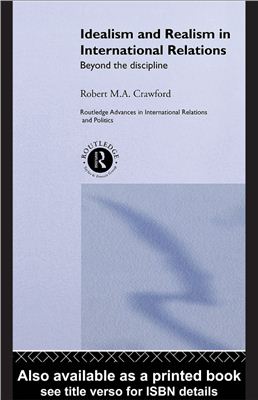Routledge, 2000. 202 p.
The essential contestability of the theories of Inteational Relations has remained a constant aspect of its study. Conventional accounts, however, render debates about theory more manageable by their tendency to roam within the boundaries established by the allegedly
timeless discourse between idealist and realist conceptualizations. Idealism and Realism in Inteational Relations accepts the premise that idealism and realism form the fundamental axis of contention in the subject. It rejects as mistaken, however, the tendency to treat these
visions as paradigms. Robert Crawford instead conceives them as philosophical faultlines that do not merely divide the field but militate against its depiction as a consolidated academic discipline. The author argues for a revised conception of Inteational Relations, that takes heed of the fundamental irreconcilability of its theories while continuing its conce with important substantive issues.
Robert M.A. Crawford is Lecturer of Humanities and Social Sciences at the University of British Columbia, Canada. His previous publications include Regime Theory in the Post-Cold War World:
RethinkingNeoliberal Approaches to Inteational Relations and InteationalRelations—Still an American Social Science? Towards Diversity in Inteational Thought (co-edited with D.S.L.Jarvis).
Introduction: idealism and realism in Inteational Relations
The roots of diversity in political and social theory: competing visions of progress
From idealism to realism: the myth of progress in Inteational Relations theory
Idealism, realism and national differences: the American case
Idealism, realism and national differences: the British case
A discipline pas de commme les autres? Inteational Relations and the real problem of theoretical pluralism
The essential contestability of the theories of Inteational Relations has remained a constant aspect of its study. Conventional accounts, however, render debates about theory more manageable by their tendency to roam within the boundaries established by the allegedly
timeless discourse between idealist and realist conceptualizations. Idealism and Realism in Inteational Relations accepts the premise that idealism and realism form the fundamental axis of contention in the subject. It rejects as mistaken, however, the tendency to treat these
visions as paradigms. Robert Crawford instead conceives them as philosophical faultlines that do not merely divide the field but militate against its depiction as a consolidated academic discipline. The author argues for a revised conception of Inteational Relations, that takes heed of the fundamental irreconcilability of its theories while continuing its conce with important substantive issues.
Robert M.A. Crawford is Lecturer of Humanities and Social Sciences at the University of British Columbia, Canada. His previous publications include Regime Theory in the Post-Cold War World:
RethinkingNeoliberal Approaches to Inteational Relations and InteationalRelations—Still an American Social Science? Towards Diversity in Inteational Thought (co-edited with D.S.L.Jarvis).
Introduction: idealism and realism in Inteational Relations
The roots of diversity in political and social theory: competing visions of progress
From idealism to realism: the myth of progress in Inteational Relations theory
Idealism, realism and national differences: the American case
Idealism, realism and national differences: the British case
A discipline pas de commme les autres? Inteational Relations and the real problem of theoretical pluralism

